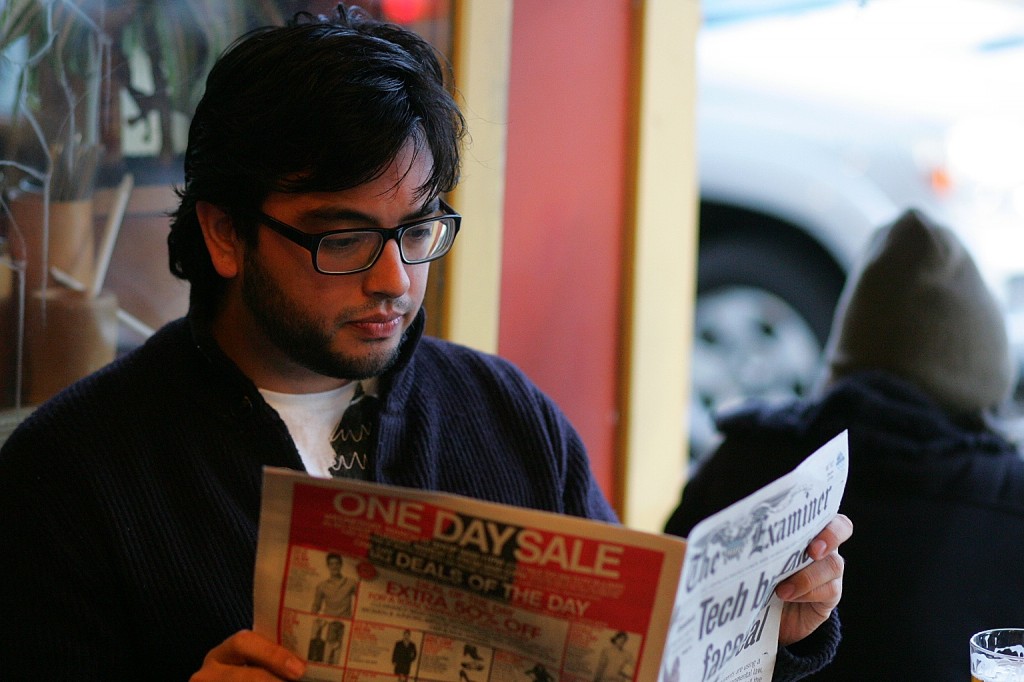Former Guardsman editor-in-chief is honored with an award as a ‘Bay Guardian’ reporter

By Jackson Ly
The Guardsman
City College alumni Joe Fitzgerald will be honored March 20 by the Society of Professional Journalists with a James Madison Freedom of Information Award for his investigative story, “Friends in the Shadows,” about San Francisco City Hall giving financial “gifts” to city businesses.
Fitzgerald gives credit to Journalism Department Chair Juan Gonzales for helping him become the journalist he is today.
“Working for Juan was great because Juan throws you out there,” Fitzgerald said. “You’re like a bird in a nest. He grabs you by the neck and throws you out there.”
Fitzgerald entered the journalism world when he took Gonzales’ news writing class in spring 2011 and became a Guardsman writer and editor.
Interested in investigative stories, Fitzgerald reported on a major virus attack on City College’s computer systems, which involved sifting through 200 pages of public documents and emails from public officials.
“If people are passionate to their bones, then they’re going to do great things,” Ingleside Light editor Sara Bloomberg said about Fitzgerald.
Bloomberg, who continues to collaborate with Fitzgerald, said he lives, breathes and drinks journalism.
“I’m not surprised that he’s going to win an award, and I think it’s about time,” Bloomberg said.
Fitzgerald reached audiences around the world when he covered the 2011 Occupy Oakland protest for The Guardsman. It was his first time covering a national issue, and he was surrounded by hundreds of people and armed police officers.
All was calm, until “one dude threw a water bottle into the air,” Fitzgerald said. That was when police officers hurled tear gas and flash grenades into the crowd. Eye-burning gas and bright blinding lights shrouded the streets, as officers began shooting rubber bullets at the protesters.
Fitzgerald could see blood running down the backs of protesters as he and those around him vomited from tear gas and dodged projectiles coming from every direction.
Fitzgerald said he was supposed to be live-tweeting the protest, but “I couldn’t trust myself to type because I was getting shot at.” Instead, he communicated via cell phone with Guardsman Twitter correspondent Becca Hoekstra.
Fitzgerald was telling Hoekstra what was happening on the ground level while she fed him Twitter updates. On that day @SFBreakingnews, The Guardsman’s Twitter account, increased its followers “from 200 to 1,200 in one day,” he said.
Growing as a journalist
While juggling two day jobs and taking classes, Fitzgerald was also the editor-in-chief for The Guardsman. He expected his staff of writers and editors to be reporting at the level of the San Francisco Chronicle.
“I really pushed The Guardsman at the time to do big things,” Fitzgerald said. “It’s not saying ‘oh … we’re just a college paper.’ It’s (about) how are we going to take care of 80,000 people.”
When there was a statewide initiative to curtail the number of students in community colleges in California, Fitzgerald mobilized his staff to call all 112 community colleges in California to alert them about the issue. At least 15 of the 60 colleges that had newspapers placed the story on their front page, while others included them in their newspaper.
Fitzgerald went to the state capitol and testified against the initiative.
San Francisco City Attorney Dennis Herrera quoted Fitzgerald’s Guardsman story when he filed his law against the Accrediting Commission for Community and Junior Colleges.
When he first started reporting, Fitzgerald said the hardest part was finding good sources for his stories. After covering huge issues such as Occupy Oakland and City College’s accreditation, he was able to network with many other professionals.
At the student success task force meeting, Fitzgerald was angry that the accreditation committee did not allow him and the press to enter. There, he saw San Francisco Chronicle education reporter Nanette Asimov, who gave Fitzgerald her business card and support.
“If you need anything, let me know,” he recalled her saying. “She’s been my mentor ever since.”
Tim Redmond, investigative reporter and former Bay Guardian editor also mentored Fitzgerald.
He learned from Redmond that “honey works better than a hammer.”
Fitzgerald, whose pen name is Joe Fitzgerald Rodriguez, currently works for the Bay Guardian.
He used that advice to gain access. The Society for Professional Journalists recognized Fitzgerald’s use of “public records, interviews and independent research to probe how developers, corporations and city contractors use indirect gifts to city agencies to buy influence” in honoring Fitzgerald.
“You want to get a source to want to help you,” Fitzgerald said. “There’s no sense in smacking a source around unless you have to.”
Fitzgerald said networking with freelancers and having a strong work ethic helped him to succeed as a journalist.
“Sometimes I might have cared too much. I might have been a little bit too passionate,” Fitzgerald said. “I would rather be that than the opposite.”

Comments are closed.